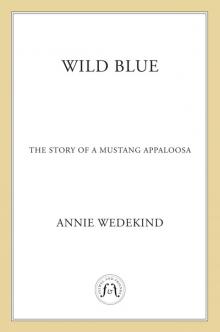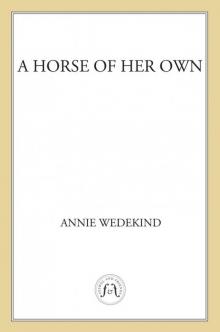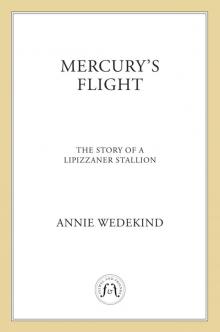- Home
- Annie Wedekind
Mercury's Flight - The Story of a Lipizzaner Stallion Page 7
Mercury's Flight - The Story of a Lipizzaner Stallion Read online
Page 7
Instead of tight turns and subtle movements—progress by the inch, as our careful training went—we had acres of land on which to run. Run! I actually galloped with Max aboard, scaring deer and flushing birds from the grass! The Colonel had urged us to take advantage of the fields of Lainz, and we did—I leaped over brooks just as I did at Piber, but this time with a different friend running with me. Not Ned, but my Max, clinging gamely to the saddle as I used my body in ways I hadn’t since I was a colt. As the smell of cypress and chestnut trees filled my nostrils and the damp earth cushioned my hooves, I marveled at what we could do together. Not only did Max teach me to dance, he also let my body sing. It was a piece of childhood, unearthed in us for a too-brief time, that I treasured forever.
The end of summer brought an end to our sojourn outside the palace. On a warm, star-strewn night, with an enormous August moon hanging fat and yellow in the trees, Max paid a late visit to our temporary barn, where Maestro and I were dozing in adjoining stalls. As I blinked sleep from my eyes, I was disappointed to see that the heaviness had returned to Max’s shoulders. Like me, he had flourished in Lainz, turning nut brown and sort of relaxed and loose all over. But when he was melancholy, his whole form seemed weighed down—rather like a horse’s does, actually. His eyes sparkled with tears in the moon’s half-light, and as he fed me sugar, he buried his face in my mane. I stood very still, feeling him breathe against me. There is so little that a horse can do when we feel the sadness and anxiety of our companions. But we can bear their weight, so I held steady for Max as he cried against my shoulder.
“I will see you again, Schnecki,” he told me. “And you, too, Maestro. I promise I’ll try. There must be a place for us on the other side of this madness.”
And I knew he was saying good-bye. I didn’t know where he was going—if he was being claimed by the hungry war or if he was going on another path—but I knew in my heart that I would not see him in the morning. I neighed in distress, and he shushed me gently. When I wouldn’t settle—and I couldn’t, with the sour-feeling fear in my belly—he began to hum, and then to sing. I had never heard Max sing before, and the surprise of it was enough to stop my pacing.
All my dreams go back
Where my sweet country is
Green woods, flowery meadows
And stands my old, old country home.
I know I shall return
Return, return
My wanderings will end
I’ll be there again
In my beautiful country.
His voice was husky and cracked in places, but I loved the sound of it. It reminded me of birds at dusk, calling plaintively to their mates to come home, lamenting the end of the day and the setting of the sun. I wanted him to stay, to sing to me till the sun came up again, but he cupped my muzzle in his hands a final time, kissed me on my nose, and was gone.
* * *
The Colonel wanted to start performances again, back at the Winterreitschule, but I had little heart for them. I had little heart for anything, except for Polak, and since his promotion to Reitmeister, head of all the riders, he was busier than ever. I tried my best for him, but I was totally indifferent to the German riders who had arrived at Die Spanische to build up the depleted staff once more. I was stalled. Worse—I was backsliding. I was getting nowhere with my passage, and soon I dreaded being led out of the Stallburg to work, unless it was Polak’s hand on my bridle. The Colonel talked of sending me back to Lainz, or even to Piber, but Polak was determined to try to bring me round, step by belabored step. For him, I tried. Was the horse still sick, the Colonel demanded? He had shown such promise! I was sick—sick at heart.
“This can’t continue, young stallion,” Maestro said abruptly one evening. “It is time to call upon your inner resources.”
“My what, sir?” I was in no mood for a lecture from my imperturbable neighbor.
“Your inner resources. Your bloodline. Your abilities. The things that serve as your bulwark in times of distress.”
“But that was Ned.” Hadn’t Maestro noticed that I had lost all of the things that held me up?
“No—it is not Neapolitano Galanta. Nor is it Max Müller, or even Gottlieb Polak. Look within yourself. Do you remember being your mother’s foal?”
Little did Maestro know that this was the worst thing he could have said.
“I was never my mother’s foal,” I said curtly.
Maestro looked at me curiously.
“She rejected me at birth. I was raised by Ned’s mother.” So there, I thought. Just try to jolly me out of that memory. I expected Maestro to be horrified. After all, no one in the Stallburg knew the shameful secret of my origins. Now I didn’t care. Whose opinion was left that mattered, after all?
But Maestro, as ever, hardly twitched his tail. He looked totally indifferent to my shocking revelation.
“Ah, yes. She was probably too young to be a dam, or perhaps was sick herself. No matter. It wasn’t your fault, and you soon found a proper mother. Now I understand why you and Ned were so close, of course. But as I was saying…”
It wasn’t your fault.
“What do you mean?” I whinnied. “Of course it was my fault!” I felt completely overthrown.
“Hmm? Don’t be ridiculous. Everyone knows that some mares aren’t ready to be mothers at certain times, or circumstances prevent them from being so. It’s not uncommon. Has absolutely nothing to do with the foal,” Maestro said dismissively.
It wasn’t your fault.
“You don’t think that … there’s something wrong with me? Sir? Like … everyone leaves eventually, and, well, there will never be anyone again who … loves me?” I felt ridiculous, but Maestro’s words had unleashed a storm of feelings, and I couldn’t bother to wait until I was coherent to question him.
“Do I think there’s something wrong with you? No, except you’re melancholic. Does everyone leave eventually? Yes—we all die. Is there anyone who loves you? I can think of many. Ned, who is still in the world, if not in the stall next door. Young Max, who is bravely fighting for his own threatened freedom. Reitmeister Polak, probably Die Spanische’s greatest teacher since Max von Weyrother,1 who has taken a special interest in you, for which you should be honored. Your surrogate mother, who raised you so well that you became one of only three horses to be selected for Die Spanische from your class at Piber. Colonel Podhajsky, who is so concerned about your health that he is thinking of putting you on a train back to the stud, which would involve considerable expense and inconvenience. The other horses in the Stallburg, from Conversano Bonadea to Maestoso Slava—whom you might notice never bullies you anymore—who think of you as “Uncle Mercury” and regularly comment that you’re the smartest horse under saddle. And perhaps the feelings of your nearest neighbor, who has lectured you so frequently, are of no interest, but if they were then I might mention that you are quite dear to me as well. If all that isn’t enough to live for, than I don’t know what is.”
I was stunned. It was all too much to fully grasp. I felt simultaneously guilt-stricken and possessed by hope.
“I’m … dear to you?” was all I could manage in response.
“Quite,” Maestro snorted. “So pull yourself together, for heaven’s sake.”
* * *
Maestro could not have timed his intervention better, for that was the night of the first air raids over Vienna.
I could not sleep—I had too much to think of, and too much too feel, for rest—so I was already awake for the first wail of what we would soon learn was the air raid siren. Fritz was with us moments later, marshalling the grooms and directing our orderly procession from the Stallburg to the Winterreitschule. His hands were shaking but his voice was steady. The night air was cold and thick with noise and the first hints of smoke. I looked for stars but found the distant lights of planes. We passed quickly through the arches into the riding hall, where the Colonel, Polak, and the other riders were helping to secure other stallions, and pacing the len
gth of the arena, looking to the windows, to the dark outside.
An air raid is really an incredible racket. From the waspish hum of approaching bombers to the thunderclaps of the bombs to the shrill tinkle of breaking glass—it’s an orchestra of fury that reminded me of violent summer storms in the mountains of Piber. It’s odd—we were nervous but not terrified, perhaps because we had all of the humans with us, perhaps because there was a bit of a festive feeling about being together in the Winterreitschule so late at night. One dependable school stallion thought we were here to work, and calmly executed a piaffe as we waited out the storm. Even Slava behaved himself. It was worse when the bombs came closer, shattering the windows above our heads and shaking the crystals of the one remaining chandelier that the Colonel hadn’t taken down yet. Poor man, he felt the breaking of each pane of glass as a body blow, and he paced and swore and winced much more than we horses. But at the height of the attack, when even Maestro and I got a little jumpy, a new sound filled the hall and riveted our attention. It was, for us, the sound of our days, played at night in the midst of war, which was so strange, yet so sweet and fitting, that we stopped our nervous perambulations to listen with our whole hearts.
It was a song we often heard during our morning exercises, a song often played during our performances. The familiar, cadenced notes echoed up, up to the snowy, broken beauty of the hall around us, and despite the delicacy of the song, it was enough to silence the noise of the bombs around us. I looked for the source of the music—we usually had either a small orchestra or a gramophone accompanying our performances—and saw the outline of Reitmeister Polak, hatless, head bowed over the violin he played, his eyes closed, and his face nearly lost to the shadows cast by the flickering lanterns that were our only light. He played as the walls shook, and as the drone of the planes finally receded into the gray light of early dawn. I swayed in time to his bow; though he was only one man, with one violin, his music filled the school up to its brim. When the last note hung high in the great dome above us, it was succeeded not by explosions, but by the first birdsong of morning.
CHAPTER 10
The high whistle of the train pierced the evening air, and Maestro and I turned our heads to it eagerly, more than ready to be on our way. We had had enough of air raids, enough of destruction, enough of the mad confusion of the past months. I was completely, thoroughly sick of the interruptions to my training, which in the wake of the loss of Max and my conversation with Maestro, I had thrown myself into with a fury, determined not to insult the memory of my friends or the good opinion of my neighbor and trainers. It hadn’t been easy, what with the riders of varying skill that I bore, or with the occasional, baffling interruption to be hitched to carts to transport goods from one part of Die Spanische to another, but I was trying to stay on task. Maestro reminded me to do what I could, instead of wishing for what I could not have. But he also reminded me that it was permissible to hope, even in war.
And so I did hope. My hopes were not specific, but rather centered around an idea of life for Ned and Max. Of course, selfishly, I imagined they could only be happy with me, as I could only be truly happy with them, but I was willing to picture them unhappy as long as I could imagine them alive and somewhat well. Amazing how war lowers one’s expectations.
The train whistle blew again, scattering a few of the younger stallions like a flock of grouse, while the grooms scrambled to hold them together and in some kind of a line to board our boxcars. A thin blanket of snow covered the city, masking some of the scars of bombs, and lending an aura of late-winter peace to our walk backward from the Hofburg to the Südbahnhoff. We had mercifully been spared an air raid today, and now we were headed north, out of the path of the advancing lines of Russians and Americans who apparently had the upper hand in the war. We had lost most of our German grooms and riders to the front. Maestro said that he smelled the end approaching. I asked him what exactly “the end” smelled like, and he said, “Exhaustion, sweat, and homesickness.” I suppose I could sympathize with that, if I had any sympathy for the Germans, but mostly I wanted them to go home, and to give back Ned and Max. The phrase “Don’t let the barn door hit you on the way out” sprang to mind.
The Colonel was a man possessed. For months he had traveled hither and yon searching for a safe haven for his white horses as the armies converged around us. I believe he wouldn’t have cared if wild boars suddenly entered the war and won it, so long as they left Die Spanische in peace and gave us our regular monthly allotment of oats. Now I watched him marching the length of track before us, inspecting our cars, checking feed, signing papers, and yelling at porters. It had been a tedious day of delays, and I suspected if we were held back much longer the Colonel might start brandishing his birch crop at the stationmaster.
We did finally board the train, and began our four-day journey north to the village of St. Martin-im-Innkreis. It was a long four days, relentlessly punctuated with warning sirens and all-clears. At times our cars were uncoupled from the engine and left on the tracks for hours, causing new paroxysms of fury in the Colonel. And at Linz, we endured a two-hour air raid, rattling in our boxcars like oats in a bucket, the Colonel and his wife tucked in with us. We bounced and winced and swore, but at least we were together. By the time we arrived at St. Martin, we were all so grateful for terra firma that we fairly leaped from the trains.
St. Martin was, appropriately, a castle, but like the palace of Die Spanische, it was, in a way, under siege. The countryside was just beginning to soften into spring, and there was such peace in the rural scents of new grass and swelling waters that for a moment I could imagine I was back at Piber. The spell was broken by the conditions at the castle itself—a hive of men and animals who all looked like they’d really rather not be sharing the same quarters. Many of the men spoke in a strange, rough tongue and seemed ill and tired. Then there were clutches of Austrian women and children, equally unhappy and frightened, German soldiers with the smell that Maestro had pointed out to me, and at the head of them all, a Countess who was at once exasperated and bemused at what had become of her home. Refugee camp, POW camp, Wehrmacht headquarters, and now, home to sixty or so stir-crazy Lipizzaners.
I’m afraid we didn’t make a very good first impression. They had built our stalls out of some absolutely delicious wood, and we happily chewed it all night long. I was delighted to see that after I nibbled away half my door, I could sidle out and visit Maestro. Bonny had discovered the same thing, and he joined us. Slava burst out of his stall and began terrorizing some of the younger horses, but we stayed snug at our end of the stable, chewing bark and happily looking about us, until I shooed Slava away from the youngsters and sent him wandering out in the courtyard, neighing for mares. Adrina, unsurprisingly, joined him, and woke up half the castle. “Laaa-aaa-diiiieees! O Laaa-aaaa-diieeees!”
The Colonel was not amused.
* * *
We spent our days hacking in the countryside (and learning to seek shelter under stands of trees when we heard planes approaching) and watching the hurly-burly of what I would realize was the end of the war. We made friends with some of the rough-tongued men, and they occasionally helped with our grooming and feed, as we barely had a staff. And then one unforgettable afternoon, a new group of men entered our stable, bristling with weaponry, gray and helmeted and shouting as they opened our stall doors and poked through the hay: “Hier nicht SS? Hier nicht SS?”1
“Ah,” said Maestro. “The Americans have arrived.”
“They have?” I asked, wondering who exactly “the Americans” were.
“Yes, young stallion. I believe our war may be over.”
We were taken from the stables so the Americans could turn them inside out, and as I stood tethered to a large linden tree in the courtyard, I watched the strange, fantastic scene. The last of Die Spanische’s German staff had hastily switched their military uniforms for other softer-looking clothes and stood about looking a little forlorn. Uniformed Germans had been crowded
into a pen like so many cattle, if cattle were ever watched over by gum-chewing boys with guns. The Easterners (the rough-voiced men) were on some sort of a spree—grabbing armfuls of foodstuffs and lighting cigarettes with great satisfaction. The Colonel was talking to a man who looked from his bearing as if he were in charge of things now, and a gang of village children begged sweets from the soldiers. I was given a peppermint and a pat from one of the Americans and decided on the spot that they represented a change for the better. But it was what happened next that won me to them forever.
All day, American soldiers, Germans, villagers, and refugees streamed through the castle of St. Martin. They came on foot, by car, and by truck. I spent that sunny spring afternoon watching their procession, and was interested to see that one of the Americans—or so I guessed from the shape of his helmet, which looked like a basin for water compared to the Germans’ fancier headgear—was riding a horse.
“Cowboy!” cried one of the children, pointing to him.
“Giddyup!” the soldier called back, grinning, and spurred his mount forward. There was something familiar about the rattle of hooves on the gravel. I watched curiously as they came closer, skirting the line of miserable Germans being added to the pen. The horse was dirty, disheveled, and wearing unfamiliar gear. I strained against my ties, hoping for a better view, raising my nostrils to the air to see if I could catch the stallion’s scent. And then he turned, stopped in his tracks, and sent a tremendous whinny over the courtyard:
“Schnecki! Schnecki! Are you here? Schnecki!”
With one leap, I snapped the rope that bound me to the tree. I think I could have broken through any chains, tore down any prison walls, or flown over armies and battlefields. Joy nearly stopped my heart, but it gave my feet wings. I suppose Mercury finally flew when the name Schnecki was called.
The American wisely dismounted just before Ned leaped forward to meet me, our trumpeting neighs echoing off the ancient stone walls, bouncing off jeeps and wagon carts. It was really Ned. Shaggy, thin, caked in mud from his knees down, and looking happier than I’d ever seen him. The Colonel shouted for someone to catch us, Maestro and Bonny and Adrina set up a chorus of whistling, piercing welcome, and the American soldiers laughed, slapping their knees in childlike delight as Ned and I buried our noses in each other’s manes and cried.

 Wild Blue - The Story of a Mustang Appaloosa
Wild Blue - The Story of a Mustang Appaloosa Little Prince - The Story of a Shetland Pony
Little Prince - The Story of a Shetland Pony Samirah's Ride
Samirah's Ride A Horse of Her Own
A Horse of Her Own Mercury's Flight - The Story of a Lipizzaner Stallion
Mercury's Flight - The Story of a Lipizzaner Stallion